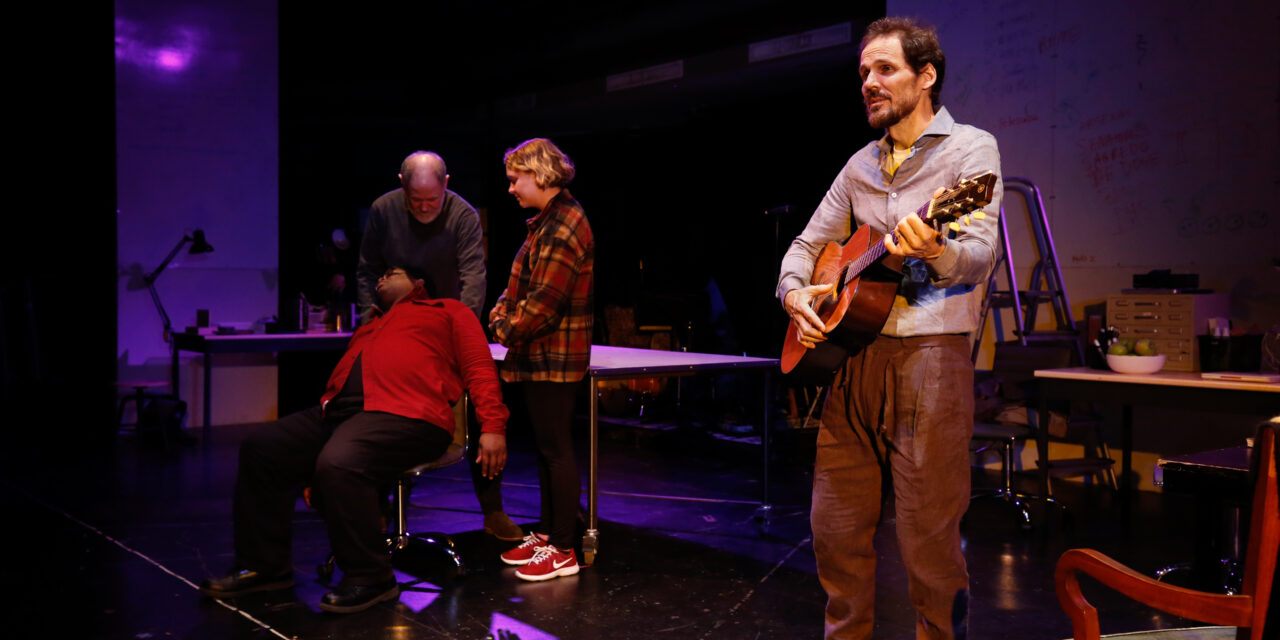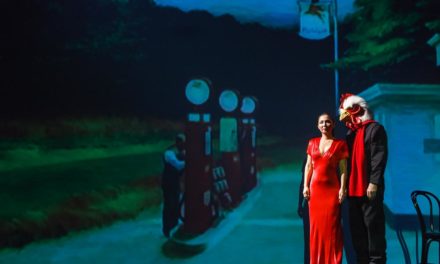New York’s Irondale Project presents a scrupulously faithful production of Brecht’s The Life Of Galileo at their home in Fort Greene, Brooklyn. Galileo is the first of a triptych of Brecht plays on Irondale’s production schedule this year. All three plays are connected by the fact of having been written in exile as Brecht sought to escape the ascendancy of the Nazi party in his native Germany, traveling first to Stockholm and later, Helsinki.
The parallels between the rise of Fascism in 1930s Europe and its troubling contemporary global corollary render Galileo innately topical. Brecht’s influential theory of epic or dialectical theatre is as integral to his legacy as is his work as a playwright. Irondale describes their mission as a theatre of ideas which presents challenging, demanding, and entertaining work. With Galileo, they hew most closely to the former, skimping on the latter.
This current production, in an authoritative translation by Mark Ravenhill commences with the spare cast of four actors appearing on a stage set with modern office furniture and stark white sheetrock scrawled with chalkboard-like scribbles in colored markers. With the exception of a brief flourish of color from an upstage right video screen later in the play, these colored markings are rare concessions to the adornment of the entire evening. The lighting is likewise interrogation-stark-white and visually flat save for a few moments where a wash of red or blue lights serves as effective scenery substitutes. The costumes are muted office casual street clothes.
Director Jim Niesen, also Irondale’s Artistic Director, adheres loyally to an aesthetic of dispensing with traditional components of scenery and instead, emphasizes the artificiality of performance. Like French filmmaker Jean-Luc Goddard, a fellow Marxist, Brecht’s insistence that political dogma is integral to his work ultimately serves the artist more than the audience. An early scene where the actors address the audience with a concise synopsis of Brecht’s backstory, as engaging as it is expository, is a highlight of the evening.
The titles on the upstage screen are effective in furnishing the performance with essential information without being distracting. The actors move efficiently on the set and the sound is spare and unobtrusive. The evening’s most enduring message is the dilemma faced by Galileo in his zeal to share his discoveries with a society uninterested in innovation or non-conformity.
The compelling acting, particularly by Joey Collins in the titular role, does much to convey the particulars of Brecht’s faithful bio-drama about the famed Renaissance-era astronomer. The cast is consistently committed with Michael David Gordon offering the bulk of the evening’s occasional moments of humor. A highlight of the play is a fraught scene later in the performance between Collins and Chantelle Guido. She is never more dynamic than when she is playing off Collins. With four actors performing over 40 characters, the inevitable confusion of doubling of roles renders Galileo more disorienting than necessary and is the evening’s most questionable artistic choice.
That said, Jim Niesen’s staging conveys the plot of Galileo cogently while simultaneously underscoring the parallels between the titular figure’s struggle with a society skeptical toward his revolutionary discoveries and his ultimate capitulation to convention. How that dilemma dovetails with the prevalence of similarly revolutionary developments in European politics during Brecht’s time in exile is the enduring reveal of the evening.
The Irondale deserves credit for presenting the work of a major 20th-century playwright who tends to get more play in his native Europe than here in the US. It is intriguing to ponder what Irondale plans to do with their next Brecht production.
Galileo is currently playing at the Irondale Center at 85 South Oxford Street, Brooklyn, New York.
This post was written by the author in their personal capacity.The opinions expressed in this article are the author’s own and do not reflect the view of The Theatre Times, their staff or collaborators.
This post was written by Jack Wernick.
The views expressed here belong to the author and do not necessarily reflect our views and opinions.


















